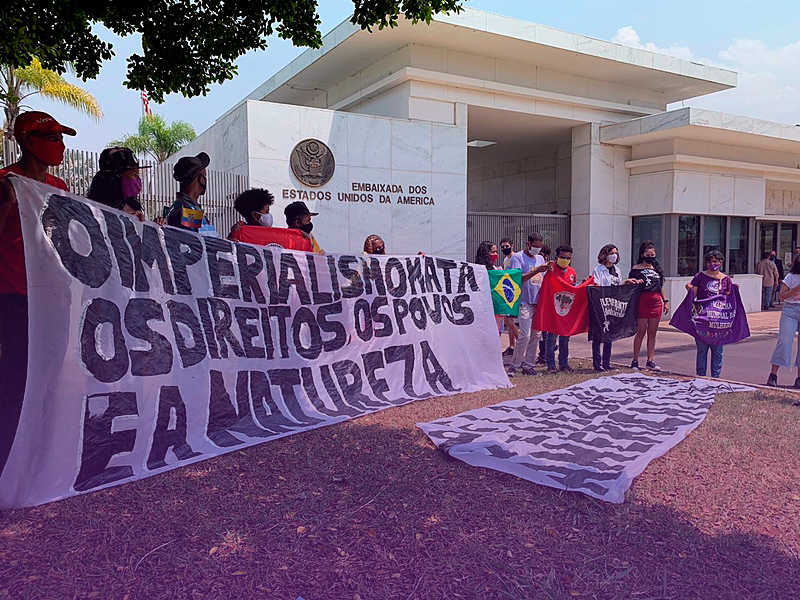On April 24th, 2023, which marks the Day of Feminist Solidarity and Action Against Transnational Corporations, the World March of Women Americas and ALBA Movements published a document about the connections between big corporations and armed conflicts on the continent. In “A Feminist View on the Permanent War Against the Peoples: Colonialism, Imperialism, and Conflict in Women’s Everyday Lives,” the WMW Americas and ALBA address the historical impacts of the Monroe Doctrine, as a landmark of US imperialist policy. The document aims to “analyze how this doctrine affected the Latin American and Caribbean dependence on the United States, as well as how its consequences still affect our lives, being present in the militarization, in the exploration of common assets, and in the expropriation brought by transnational corporations to the territories of Abya Yala, Our America.”
200 after the implementation of this policy, the US destructive role is striking in Latin American and Caribbean countries, which resist extractivism, military occupation and blockades, the exploitation of labor and nature.
To analyze the geopolitical conjunctures, we cannot start from nothing, taking into consideration only the present time. Our continent has been subject to imperialist disputes since white European men landed in our pacha. And the pressure over the territories and bodies of the Americas did not stop with the victory of the 19th century independenceist movements.
World March of Women—Americas
Here is an excerpt from the document. The full version is available in Portuguese, Spanish, English, and French.

(…) Even when war is not openly declared, we cannot say we enjoy peace. This is so because the vision of peace built by the liberal society as absence of war tries to hide, under economic interests, numerous conflicts, disputes, and forms of violence the peoples suffer in their territories. In addition, the mere existence and maintenance of military armies as defenders of sovereignty and order imply the imminence of war and conflict in people’s everyday life. Feminists criticize precisely this understanding of “peace”. There is, in fact, a non-peace, that is, times when there are not armed conflicts, but during which we live under threat, in States that do not guarantee human rights, that pledge our future, that sell and explore our common assets for transnational corporations supported by the United States war power.
In our analysis, we identify that this model organizes by intensifying the capital-life conflict, which keeps using the same accumulation mechanisms it has been using since the beginning: control over labor force, over bodies, and over territories, always with much violence. This is why we name it a permanent war against the peoples. It happens through armed conflicts, militarization of territories, the police structure, through control over boundaries, and criminalization of poverty. Racism, patriarchy, and persecution of gender nonconforming bodies are strongly rooted in it.
We position our critical view against the construction of militarism as a gear of the capitalist, racist, and patriarchal social structure. The pillars of militarism are discipline, hierarchy, and the establishment of a masculine superiority based on force to maintain property, elite interests, and a so-called “safety”. From the point of view of militarism, social conflicts are solved with confrontation, when a different element is viewed as an enemy to be fought and eliminated, a threat to safety, to development, and to social cohesion. In this model, the men of the armed forces protect the capitalist State or private property against any threat, be it internal or external. With the dominance of transnational corporations over militarization, the safety policy becomes increasingly private, controlling territories by means of armies, the police, and the militia, which do not walk opposite paths – they are actually two sides of the same coin. Disputes over power and the situation of permanent war are engraved in women’s, children’s, and gender nonconforming identities’ bodies, who witnessed how rape and femicide are regular practices that serve not only to discipline women and gender nonconforming people, but also as alarming messages to the rest of the population.
(…) Wars are organized around companies’ profit, funded by public resources. The United States are a clear portrait of that: the country that seeks to maintain an imperial domain over the world is the one that spends more with the military, which has increased over the last years. Meanwhile, its population has no access to basic rights, such as health care.
Understanding this connection between increased power of transnational corporations and expansion of wars against the peoples is key to organize our stance. The war against the peoples is expressed not only in conflicts and occupations, but also in the everyday operation of a model marked by the capital-life conflict. Most of the power and wealth generated by the capital-life conflict goes to transnational corporations. The offensive of the corporate power tramples women’s bodies, labor, and territories by using militarization as an instrument. In this regard, focusing our actions against transnational corporations’ power is crucial in the anti-war agenda. (…)
Monroe Doctrine: Origin of US Imperialism
The Monroe Doctrine was conceived in 1823 during a rearrangement of the capitalist hydra following independence processes in the Americas. At first, on paper, the doctrine focused on the need of the recently created United States to keep out of the continent colonialist powers that could pose a threat against their own sovereignty and right to self-determination. But, soon enough, it became the basis on which US governments built their eagerness to dominate and exploit the rest of the continent.
Summarized in the phrase “America for the Americans”, the doctrine defines any intention of European countries to extend their interests into the continent as a danger to the United States of North America’s integrity, as well as declares a supposed commitment to protect the Americas from colonialism. Soon, the “Americans” mentioned in the doctrine would be defined. For that, the fathers of the North-American nation used an old slogan that encouraged English and Scottish Calvinist settlers to cross the ocean and establish in North America: The Manifest Destiny.
“Manifest Destiny” is the idea that expresses that, due to designs of providence, some peoples are chosen and are entitled to appropriate territories. This ideology establishes the entitlement and almost the obligation of heterosexual white men, who declare themselves chosen by divine grace to possess territories and bodies and exploit them for their own benefit. By divine grace, they are possessors of assets, to reproduce, populate, and dominate the territories pointed out by divine grace in their favor. The image of the heterosexual white man, who is a provider and comes from the recent-established elites, as universal model becomes the paradigm guiding the construction of US society.
(…) The processes of colonization experienced in the continent were, in general, based on the establishment of military and capitalist production structures to dominate the territory and the Indigenous populations. Latin America became part of the world map through war and Indigenous resistance. It is also as from these conflicts and this colonialist military structure that different resistances struggling for emancipation organized, such as the independenceist elites’ movements. (…) Several policies articulating racism and patriarchy were established as mechanisms to subdue the original peoples and control bodies, particularly women’s, by using forced militarization, whitening of populations, criminalization of poverty, and social organization promoted by the States and guaranteed by police and military apparatus.
During the 19th century, the Monroe Doctrine served to justify more than 28 armed interventions, in addition to many other unequal economic interventions. It resulted in processes such as the neocolonization of Porto Rico, the annexation of half the Mexican territory to the United States, the intervention in Nova Granada, and the usurpation of the interoceanic canal, as well as the 36-year Banana Wars that established dictatorships throughout Central America and the Caribbean and consolidated the transnational production and export of tropical fruits.
(…) This history of destruction, of permanent war, also imposes itself with the same strength over the diversity of non-white peoples who live within the boundaries of the United States. As an example, we have the painful memory of the Trail of Tears (1830), a violent process of forced displacement of nearly 60 thousand American native people, a process of ethnic cleansing that is repeatedly glorified in Westerns as the conquest and civilization of West. (…) Racism is based on the colonial mechanisms employed to form the Latin American capitalist society, which has always used the police and the military forces to guarantee its political and economic dominance and the militarist ideology to produce a controlled and disciplined society.
(…) “Peace”, “safety”, and “social cohesion” imposed by militarism do not recognize the possibilities of relationship and coexistence within the diversity we may have as humans, let alone respect non-human lives.
(…) Women have been passive subjects in this permanent war against life. We women act in resistance, we sustain the everyday life with solidarity networks that guarantee life and our cultural diversity. We place our bodies to protect territories and common assets, we denounce the consequences of this war on our peoples, and we also propose ways of organizing for production and reproduction of life in our communities. We collectively build proposals for true peace, based on justice and equity. (…)




